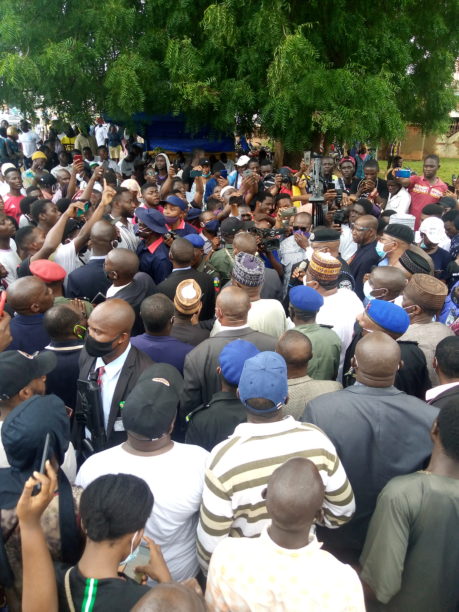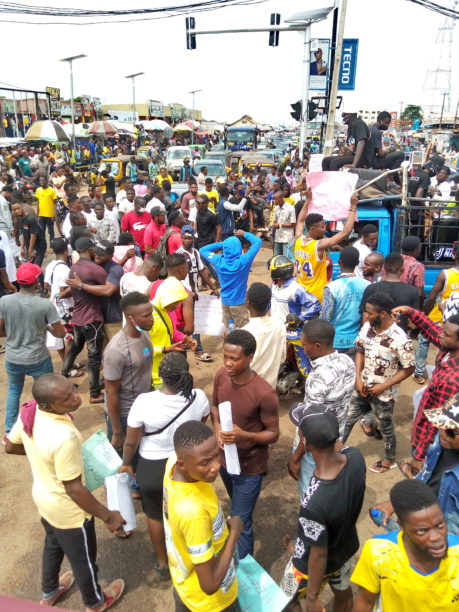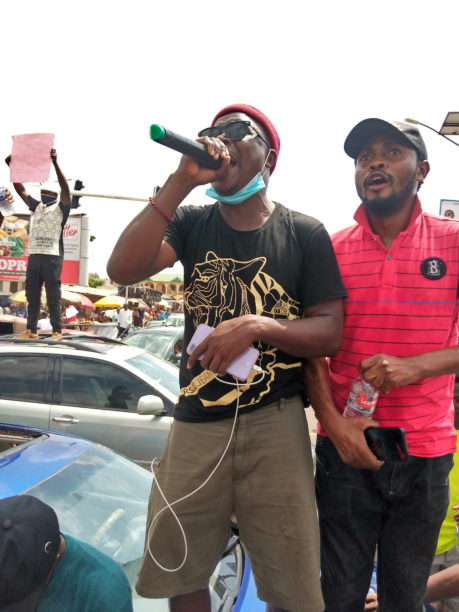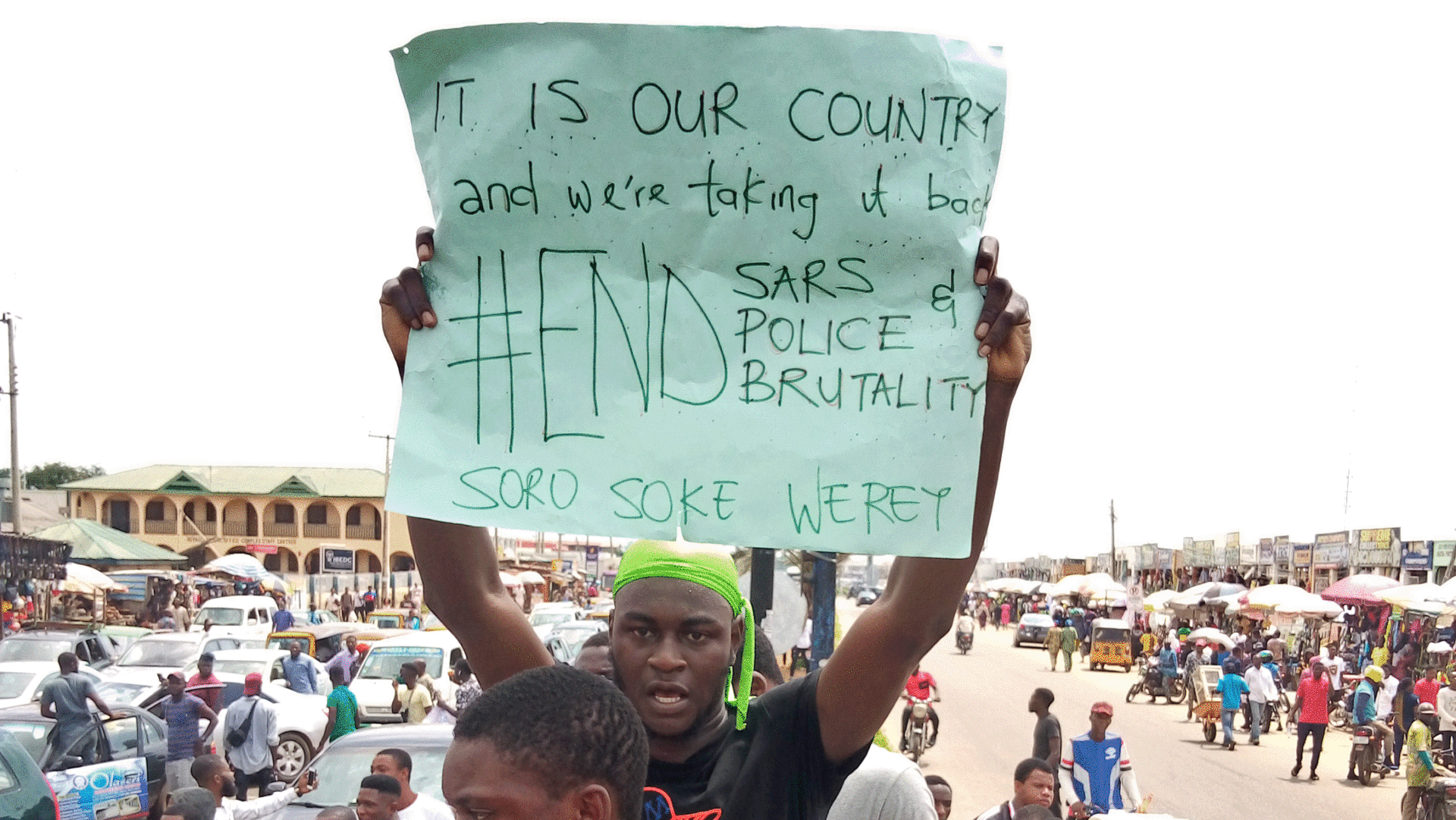Nigeria’s Special Anti-Robbery Squad (SARS), a plainclothes anti-crime police unit established in late 1992, has over the years evolved into a lawless organization engaged in the harassment, unlawful arrest, extortion, sexual abuse, torture, and extrajudicial killing of innocent citizens. And all perpetrated under the guise of fighting crime.
In recent years SARS operatives have increasingly targeted youths for harassment, particularly well-dressed young people using cell phones, under the pretext of fighting cyber crime. The Nigerian youths can’t take it anymore, being labelled as “yahoo boys” or girls (internet fraudsters) because they are well dressed or make use of quality gadgets.
“I dress clean and look good, doesn’t mean I’m a yahoo boy. I work hard for my money, said one protester. “These harassments need to stop.”
Typically SARS operatives will demand to search a person’s phone with the excuse of investigating internet fraud. Those who refuse to comply run the risk of suffering a brutal beating, being kicked or otherwise abused.
There have also been cases of SARS officials detaining young girls as ‘prostitutes’ because they use flashy phones and ‘look good’, demanding to know how they got money to buy such phones (this goes for boys too). Such encounters have ended in extortions and/or the unlawful arrest and detention of young citizens, plus other abuses, including rape. At the demonstrations you can see the pain in the expressions of former victims as they scream, “END SARS NOW!!”
“They say we’re the leaders of tomorrow. How can we lead when those meant to protect us are killing us,” a placard read.

On Monday October 12th, 2020, the city of Ilorin, where I live, had its first official protest. Ilorin, a city of nearly one million, is the capital of Kwara State, North-Central Nigeria. Hundreds of youths gathered at Challenge, to agitate in one voice for an end to police brutality. The protest was joined by a well-known young Nigerian musician, Skales.
We prepared for the march by distributing masks, hand sanitizer and cardboard for signs. Most of these materials were made available by donations organized by the Feminist Coalition through social media. Notables including FK Abudu and Moechievous also helped to spread information and mobilize resources during the protests across different states. Bouncers were also organized to maintain law and order among protesters, ensuring the events remained peaceful. Bottles of water were distributed to keep us hydrated as the walk from Challenge to the State’s Government House commenced.
Chorused songs of solidarity echoed as the youths of Kwara marched in unity to see the Governor of the State, Abdulrahman Abdulrazaq. On arrival at the State’s Government House, we observed a moment of silence for the victims who died at the hands of police, especially those killed during the protests, fallen heroes like Jimoh Isiaq and others who sought for a better Nigeria, but were killed for trying.
Unfortunately, the people were told that the governor was not on site and was unavailable to meet with us. This led to a little uproar and chants of “We want the governor.”
After a long and fruitless wait, we returned to the starting point and shut down the road. A live performance from Skales commenced.
As protests continued nationwide, the youths of Kwara did not relent, though there was a drastic reduction in the number of people who showed up on the second day, apparently due to some breakdown in communications. Still, the youths gathered, this time at Geri Alimi, whence we would march peacefully to the State’s House of Assembly to secure a meeting with the Speaker and Deputy Speaker of the House.
Cardboards were shared and signs soon made: “Graphics designer no be yahoo boy”, “Looking good is not a crime”, “IPhone no be bomb”, “This is democracy, not gerontocracy”, “Please, don’t kill me because of gadgets”, “#SayNoToPoliceBrutality”, “#EndSARS” etc. There were perhaps a hundred protesters as the march began.
These demonstrations going on all over the country transcend the brutal activities of the SARS unit. They also represent a beckoning on the government to be more accountable and responsible for its citizens, ensuring their safety as they go about their business.
At the State’s House of Assembly, protesters assembled at the gate demanding to see the Speaker and Deputy Speaker. But the response was quite disheartening. The Speaker, the Deputy speaker and also the Chief Whip were unavailable due to an ongoing strike by the Labour Congress of Kwara State. The deputy governor had previously asked for a 10-man representative group to meet with, but protesters refused to present him a figurehead, emphasizing that “the protest has no face”. This was done to safeguard against the vulnerability of a “leader” who might compromise the goals of the movement. After another long wait, the protest group disbanded at about 4:20pm.
Our Demands Must Be Met
By Thursday, October 15th, communications had been restored—there were rumors of attempted sabotage—and again there was a massive turnout. This time, the youths of Kwara were determined to see the governor, and were not ready to take “No” for an answer.
A prayer session was held at the Post Office, some minutes’ walk from the protest starting point at Challenge. Christians, later joined by some Muslims, gathered to pray for ‘A new Nigeria’, seeing the movements happening all over the country as a form of re-awakening. Reportedly, these protesters were prevented by police from moving beyond a certain location. They had planned a prayer walk, but had to settle for a stand. They sang the second stanza of the national anthem and asked God for wisdom upon the leaders and the youths.

Moments after the prayer session, protesters from Challenge arrived at the Post Office to join the others. Together, more than a thousand youths marched again to the State’s Government House, determined to remain until they heard from the governor of the state.
Police vehicles escorted the demonstration from behind as we blocked one lane, freeing the other for traffic.
As before, upon arrival we demanded to see the governor. After a while he appeared with his deputy. The protesters demanded they join the march, continuously chanting, “Join the protest!” Then the governor, alongside his deputy, marched with us to the police headquarters. He addressed and commended the youths on the peaceful demonstrations. The governor said that he appreciated the requests made by the protesters. “In terms of your complaints, we are all victims,” he said.
He promised to bring offending officers to book, especially after the frequent mention of one Mr Friday, an officer of the police force known for raiding hostels and extorting students of the University of Ilorin. Protesters also requested compensation for the families affected by police brutality in Kwara State. But these demands and the promises that follow them are not new, even at the federal level. For example, SARS has already been disbanded a couple of times over the years. Yet, they still continued to operate, and took more lives. How do these young men and women with dreams hold on to the promise of the governor, that indeed, justice would be served?
The State’s Commissioner of police also addressed the protesters, saying that he appreciated the movement and advising the youths not to be misled by social media publications. He reassured them that since his arrival as the commissioner of police, “The police has pledged to be your friend, and we’re committed to that.”
He also claimed, falsely, that since his assumption of duty, no case of police killing has been recorded. An uproar exploded in the crowd. He appealed to the youths to report directly to him concerning issues of police harassment.
Having received these doubtful assurances, we returned to Challenge, set up a roadblock and raised placards with the hopes of not having to revisit these issues again in the city. Food and drinks were distributed and music played to ease the air.
The national protests will continue, as the 5-point demands (#5FOR5) from the youths nationwide have not been met by the federal government. They are:
- Release of arrested protesters.
- Justice and compensation for families of victims.
- Independent body to oversee prosecution of officers (within 10 days).
- Psychological evaluation of disbanded officers before redeployment.
- Increase of police salaries.
So far, only the first demand has seen any action from authorities, with the push of several lawyers working round the clock to free protesters arrested in different states. But until all these demands are met, there will be no end to the #EndSARS movement.







